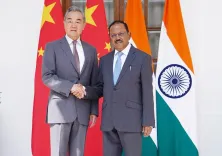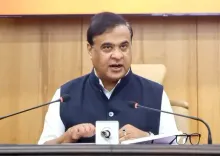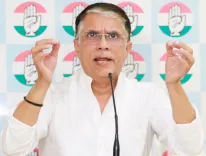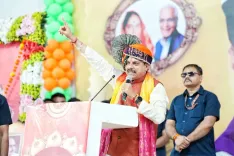Is Rahul Gandhi’s Demand for Digital Voter List Legally Valid?

Synopsis
Key Takeaways
- Rahul Gandhi's demand for digital voter lists lacks legal support.
- The Supreme Court has ruled in favor of the Election Commission's current practices.
- Privacy concerns are paramount in the discussion of voter list formats.
- The ECI provides multiple formats of the electoral roll to recognized parties.
- This issue reflects broader questions of electoral transparency and integrity.
New Delhi, Jun 26 (NationPress) The ongoing request from the Leader of the Opposition (LoP) in Lok Sabha, Rahul Gandhi, for the Election Commission of India (ECI) to supply machine-readable digital versions of the voter lists for the upcoming 2024 Lok Sabha elections and future Vidhan Sabha elections seems to lack legal grounding, as indicated by constitutional experts and sources on Thursday.
A prior ruling from the Supreme Court has already established the legality of the ECI's stance. Experts assert that Rahul Gandhi's repeated calls for 'machine-readable digital copies' are largely seen as a publicity tactic, given the apex court's previous denial of such requests.
In 2018, a petition by Congress leader Kamal Nath, who was then the president of the Madhya Pradesh Congress, sought the Supreme Court's intervention to mandate the provision of digital versions of the draft electoral rolls in a text format, alongside other requests.
The ruling from a bench of Justices AK Sikri and Ashok Bhushan stated that the format provided to the petitioner met the requirements specified in the Election Manual.
“We find merit in the ECI's argument. Clause 11.2.2.2 of the Election Manual mentions 'text mode'. The draft electoral roll was provided to the petitioner in that mode. There is no stipulation that it must be available on the Chief Electoral Officer's website in a 'searchable PDF' format,” the verdict stated.
The Supreme Court further noted that if the petitioner desired, he could convert the document into a searchable format on his own. The ECI, in its affidavit to the Supreme Court, contended that it had made a deliberate choice not to provide voter list copies to political parties in a scannable text format, to protect voter privacy.
The ECI explained that recognized political parties receive two complimentary copies of the electoral roll—one hard copy in PDF format with elector images and another soft copy devoid of images—during both the draft and final publication stages as per the Registration of Electors Rules, 1960.
Moreover, even unrecognized registered political parties, NGOs, or the general public can acquire a soft copy of the electoral roll, without elector images, on a CD for a nominal fee of ₹100.
The Supreme Court emphasized that “there is no doubt regarding the integrity of the ECI,” stating that “the citizens largely trust this institution for its impartiality in executing its duties.”
Interpreting the term “text mode” within the Election Manual, the Supreme Court clarified that the draft electoral roll posted on the official website should only include “text” of elector details, excluding “photographs/pictures/pictorial content,” and it was not mandated that the draft electoral roll must be made available as a “searchable PDF.”
It reiterated, “The petitioner does not have the right to demand that the draft electoral roll be uploaded in a 'searchable mode'. It only needs to be in 'text mode', which has been provided.”
The Supreme Court determined that the Election Manual did not obligate the ECI to furnish the draft electoral roll in a searchable text format, leaving it to the ECI to decide the format for publication.
The court recognized the ECI's rationale aimed at preventing voter profiling and data mining while emphasizing that the ECI must take all necessary precautions to secure voter privacy.
Insiders from the Election Commission have referenced the Supreme Court's ruling in light of Rahul Gandhi's accusations of a “fixed election” in Maharashtra last November and the ECI's invitation for him to participate in a clarification session, an offer he has yet to accept.
“It is true that Rahul Gandhi, as the Leader of the Opposition, has been advocating for a machine-readable, digital electoral roll for the past seven months, but such a demand from the Congress is not unprecedented,” remarked an official source.
This demand appears to be part of a broader strategy by the Congress that has been in play for over eight years, a fact that has been selectively overlooked in the current narrative, the source noted.
“Historically, the position taken by the Indian National Congress does not hold up under the current legal framework. It is worth noting that this very matter has previously been raised by the Congress before the highest constitutional court in the nation,” he concluded.






